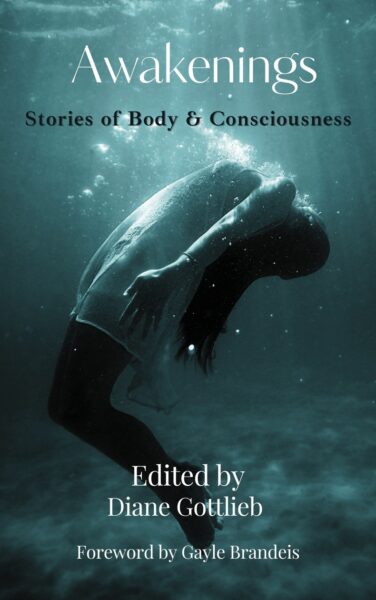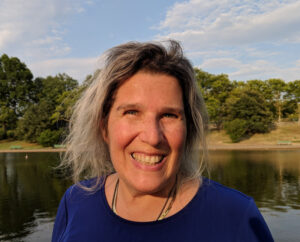
Interviewed by: Lisa Alletson
In Awakenings: Stories of Body & Consciousness, you bring together 49 brilliant, diverse voices writing short essays about inhabiting the body. There are moments of intense self-awareness, such as when Maureen Aitken asks, “What if your body is glorious now, and you are about to miss it for the ritual of beating yourself with a scale?” Was the idea for this collection inspired by your own moment of awakening or self-awareness?
Ariana D. Den Bleyker, the founder and publisher of ELJ Editions, came up with the idea for the anthology, but as soon as Ariana shared the idea with me, I jumped on it. As a writer of CNF, both flash and longer form, I often write about trauma, and many of those pieces are body-centered. Whenever a body piece of mine is published, I am always in awe of people’s responses. I’ve received so many DMs, emails, and comments in which people share their own stories. The awakening for me came when I started reading the submissions for the anthology. I learned something from each one. Taken together, the submissions showed me, on a visceral body level, how very much and in how many different ways the body holds and expresses our pain, and too often, our shame. Living in a body is truly both a universal challenge and a great gift.
The word “shame” comes up a fair bit through the stories. But the word “love” comes up more. Each essay is so intimate, brave, and personal, it took my breath. Were there common themes regarding human nature that you discovered while working on the book?
Over and over, I was inspired by the contributors’ courage. The body’s role within culture is so loaded and complicated. The messages we receive about what our bodies should look like, whom our bodies should love, and how our bodies should function are filled with harsh judgments and leave little room for difference or individuality. A common theme, expressed so beautifully in these essays, is the journey towards self-acceptance, which often includes mustering the strength to say NO! to the pressures of squashing one’s own truth. I was deeply inspired by those journeys and that resolve.
Once I started, I couldn’t put this book down. Each story is short, less than 1,500 words, with some under 500 words. That makes them easy to read in a sitting. The collection flows smoothly at the essay, section and book level. How did you curate and edit the manuscript? Did you decide on the sections before or after you read the contributed essays?
Surprisingly—it even surprised me—I had no specific expectations about how I was going to organize the essays before I read the subs. The only firm criterion for selection I had from the start was that each essay would have to move me. That doesn’t mean I’d need to bring out the tissue box for each one. I went through lots of tissues, for sure, but I was looking for essays that would make me feel—and think—deeply on many levels. If they made me laugh, that was great! I wanted each of the essays to teach me something, to provide a lens through which to see the body that I had never looked through before or had never before even been aware of. As far as organizing the anthology, I found myself listening to the essays. Many of them were in conversation with each other, and some had very strong opinions about whom they wanted to sit next to in the book! The section topics sort of just emerged, and the collection formed itself along its own arc.
How did you gather such a large group of remarkable writers?
Mostly through (relentless) social media calls. I also contacted a few contributors directly and asked them if they’d want to send me something about the body.
In your Introduction, in which you share some of your own story, you hope for readers to be inspired and awakened by this book. I was. Awakenings gave me the courage to rethink my relationship with my body. It opened paths of understanding and exploration in my life. I took pages of notes. How did reading the essays impact or change you?
Oh! I was deeply inspired by each of them! Taken as whole, the anthology feels like a powerful testament to resilience and to the beauty that emerges when we find the courage to embrace our full selves. I am so incredibly grateful to each contributor for their honesty and generosity of spirit. I’ve offered the contributors several opportunities to connect with one another, and many have taken advantage of that! They’ve grouped together geographically and are doing readings, interviews, podcasts to promote the book and, more importantly, the broader work of body acceptance. There is a feeling of great excitement among many of the contributors and a recognition that this is critical work, that their voices matter, and that by sharing their experiences, they give others hope and permission to do the same.
Awakenings: Stories of Body & Consciousness (207 pages) is available from ELJ Editions.
________________________
 Diane Gottlieb’s writing appears in 2023 Best Microfiction, River Teeth, SmokeLong Quarterly, HuffPost, Barrelhouse, The Rumpus, Hippocampus, Split Lip, and 100-Word Story, among other lovely places. She is the editor of Awakenings: Stories of Body & Consciousness (ELJ Editions) and the Prose/CNF Editor of Emerge Literary Journal. You can find her at https://dianegottlieb.com and on social media @DianeGotAuthor.
Diane Gottlieb’s writing appears in 2023 Best Microfiction, River Teeth, SmokeLong Quarterly, HuffPost, Barrelhouse, The Rumpus, Hippocampus, Split Lip, and 100-Word Story, among other lovely places. She is the editor of Awakenings: Stories of Body & Consciousness (ELJ Editions) and the Prose/CNF Editor of Emerge Literary Journal. You can find her at https://dianegottlieb.com and on social media @DianeGotAuthor.
 Lisa Alletson’s stories and poems are published in Cincinnati Review (miCRo), Crab Creek Review, Emerge Journal, Gone Lawn, New Ohio Review, Pithead Chapel, among others. Her debut chapbook, Good Mother Lizard won the Headlight Review’s 2022 publishing contest. You can find her on Twitter at @LotusTongue and Bluesky at @LisaAlletson.bsky.social
Lisa Alletson’s stories and poems are published in Cincinnati Review (miCRo), Crab Creek Review, Emerge Journal, Gone Lawn, New Ohio Review, Pithead Chapel, among others. Her debut chapbook, Good Mother Lizard won the Headlight Review’s 2022 publishing contest. You can find her on Twitter at @LotusTongue and Bluesky at @LisaAlletson.bsky.social

 The core workshop of SmokeLong Fitness is all in writing, so you can take part from anywhere at anytime. We are excited about creating a supportive, consistent and structured environment for flash writers to work on their craft in a community. We are thrilled and proud to say that our workshop participants have won, placed, or been listed in every major flash competition. Community works.
The core workshop of SmokeLong Fitness is all in writing, so you can take part from anywhere at anytime. We are excited about creating a supportive, consistent and structured environment for flash writers to work on their craft in a community. We are thrilled and proud to say that our workshop participants have won, placed, or been listed in every major flash competition. Community works.